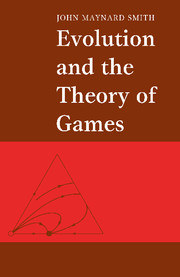Book contents
- Frontmatter
- Contents
- Preface
- 1 Introduction
- 2 The basic model
- 3 The war of attrition
- 4 Games with genetic models
- 5 Learning the ESS
- 6 Mixed strategies – I. A classification of mechanisms
- 7 Mixed strategies – II. Examples
- 8 Asymmetric games – I. Ownership
- 9 Asymmetric games – II. A classification, and some illustrative examples
- 10 Asymmetric games – III. Sex and generation games
- 11 Life history strategies and the size game
- 12 Honesty, bargaining and commitment
- 13 The evolution of cooperation
- 14 Postscript
- Appendixes
- Explanation of main terms
- References
- Subject index
- Author index
13 - The evolution of cooperation
Published online by Cambridge University Press: 05 June 2012
- Frontmatter
- Contents
- Preface
- 1 Introduction
- 2 The basic model
- 3 The war of attrition
- 4 Games with genetic models
- 5 Learning the ESS
- 6 Mixed strategies – I. A classification of mechanisms
- 7 Mixed strategies – II. Examples
- 8 Asymmetric games – I. Ownership
- 9 Asymmetric games – II. A classification, and some illustrative examples
- 10 Asymmetric games – III. Sex and generation games
- 11 Life history strategies and the size game
- 12 Honesty, bargaining and commitment
- 13 The evolution of cooperation
- 14 Postscript
- Appendixes
- Explanation of main terms
- References
- Subject index
- Author index
Summary
The evolution of cooperation among animals, either within or between species, presents an obvious problem for Darwinists. Darwin himself recognised this. He thought that social behaviour, as shown by social insects, could be explained by family selection. He also remarked that his theory would be disproved if it could be shown that some property of one species existed solely to ensure the survival of another; by implication, mutualism between species must be explained by indirect benefits to the individuals performing cooperative acts.
Despite these essentially correct insights, little progress was made in analysing the selective forces responsible for the evolution of cooperative behaviour for 100 years after the publication of The Origin of Species. For many biologists, it was enough that a trait could be seen to favour the survival of the species, or even of the ecosystem. It is clear from the writings of J.B.S. Haldane and R.A. Fisher that they knew better than this. The decisive turn to the significance of kinship in social behaviour, however, was by Hamilton (1964). Perhaps inevitably, the elegance of the idea of inclusive fitness and the prevalence of genetic relationship between members of social groups tended to distract attention from other selective forces, and in particular from mutualistic effects; that is, from the fact that two (or more) individuals may cooperate because it benefits both to do so. However, the significance of mutualistic effect was not lost sight of (e.g. Michener, 1974; West-Eberhard, 1975), and Trivers (1971) pointed out the possibility of delayed reciprocation.
- Type
- Chapter
- Information
- Evolution and the Theory of Games , pp. 167 - 173Publisher: Cambridge University PressPrint publication year: 1982
- 1
- Cited by



